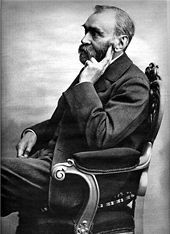Cross posted from The Stars Hollow Gazette
This is your morning Open Thread. Pour your favorite beverage and review the past and comment on the future.
December 10 is the 344th day of the year (345th in leap years) in the Gregorian calendar. There are 21 days remaining until the end of the year.
 On this day in 1901, the first Nobel Prizes are awarded in Stockholm, Sweden, in the fields of physics, chemistry, medicine, literature, and peace. The ceremony came on the fifth anniversary of the death of Alfred Nobel, the Swedish inventor of dynamite and other high explosives. In his will, Nobel directed that the bulk of his vast fortune be placed in a fund in which the interest would be “annually distributed in the form of prizes to those who, during the preceding year, shall have conferred the greatest benefit on mankind.” Although Nobel offered no public reason for his creation of the prizes, it is widely believed that he did so out of moral regret over the increasingly lethal uses of his inventions in war.
On this day in 1901, the first Nobel Prizes are awarded in Stockholm, Sweden, in the fields of physics, chemistry, medicine, literature, and peace. The ceremony came on the fifth anniversary of the death of Alfred Nobel, the Swedish inventor of dynamite and other high explosives. In his will, Nobel directed that the bulk of his vast fortune be placed in a fund in which the interest would be “annually distributed in the form of prizes to those who, during the preceding year, shall have conferred the greatest benefit on mankind.” Although Nobel offered no public reason for his creation of the prizes, it is widely believed that he did so out of moral regret over the increasingly lethal uses of his inventions in war.
History
 Alfred Nobel was born on 21 October 1833 in Stockholm, Sweden, into a family of engineers. He was a chemist, engineer, and inventor. In 1895 Nobel purchased the Bofors iron and steel mill, which he converted into a major armaments manufacturer. Nobel also invented ballistite, a precursor to many smokeless military explosives, especially cordite, the main British smokeless powder. Nobel was even involved in a patent infringement lawsuit over cordite. Nobel amassed a fortune during his lifetime, most of it from his 355 inventions, of which dynamite is the most famous. In 1888, Alfred had the unpleasant surprise of reading his own obituary, titled ‘The merchant of death is dead’, in a French newspaper. As it was Alfred’s brother Ludvig who had died, the obituary was eight years premature. Alfred was disappointed with what he read and concerned with how he would be remembered. This inspired him to change his will. On 10 December 1896 Alfred Nobel died in his villa in San Remo, Italy, at the age of 63 from a cerebral haemorrhage.
Alfred Nobel was born on 21 October 1833 in Stockholm, Sweden, into a family of engineers. He was a chemist, engineer, and inventor. In 1895 Nobel purchased the Bofors iron and steel mill, which he converted into a major armaments manufacturer. Nobel also invented ballistite, a precursor to many smokeless military explosives, especially cordite, the main British smokeless powder. Nobel was even involved in a patent infringement lawsuit over cordite. Nobel amassed a fortune during his lifetime, most of it from his 355 inventions, of which dynamite is the most famous. In 1888, Alfred had the unpleasant surprise of reading his own obituary, titled ‘The merchant of death is dead’, in a French newspaper. As it was Alfred’s brother Ludvig who had died, the obituary was eight years premature. Alfred was disappointed with what he read and concerned with how he would be remembered. This inspired him to change his will. On 10 December 1896 Alfred Nobel died in his villa in San Remo, Italy, at the age of 63 from a cerebral haemorrhage.
To the wide-spread surprise, Nobel’s last will requested that his fortune be used to create a series of prizes for those who confer the “greatest benefit on mankind” in physics, chemistry, peace, physiology or medicine, and literature. Nobel wrote several wills during his lifetime. The last was written over a year before he died, signed at the Swedish-Norwegian Club in Paris on 27 November 1895. Nobel bequeathed 94% of his total assets, 31 million SEK (c. US$186 million in 2008), to establish the five Nobel Prizes. Because of the level of scepticism surrounding the will, it was not until 26 April 1897 that it was approved by the Storting in Norway. The executors of Nobel’s will, Ragnar Sohlman and Rudolf Lilljequist, formed the Nobel Foundation to take care of Nobel’s fortune and organise the prizes.
Nobel’s instructions named a Norwegian Nobel Committee to award the Peace Prize, the members of whom were appointed shortly after the will was approved in April 1897. Soon thereafter, the other prize-awarding organisations were established: the Karolinska Institutet on 7 June, the Swedish Academy on 9 June, and the Royal Swedish Academy of Sciences on 11 June. The Nobel Foundation reached an agreement on guidelines for how the prizes should be awarded, and in 1900, the Nobel Foundation’s newly-created statutes were promulgated by King Oscar II. In 1905, the Union between Sweden and Norway was dissolved. Thereafter Norway’s Nobel Committee remained responsible for awarding the Nobel Peace Prize and the Swedish institutions retained responsibility for the other prizes.
On this day in 1787, Pennsylvania becomes the second state to ratify the Constitution, by a vote of 46 to 23. Pennsylvania was the first large state to ratify, as well as the first state to endure a serious Anti-Federalist challenge to ratification.

 Welcome to the Health and Fitness weekly diary which is cross-posted from
Welcome to the Health and Fitness weekly diary which is cross-posted from 

 On this day in 1946,
On this day in 1946,  In 1953,
In 1953,  On this day in 1901,
On this day in 1901, 
 The Joint Committee on the Conduct of the War was a
The Joint Committee on the Conduct of the War was a  John and I are in our Dakota kitchen in the middle of the night. Three cats – Sasha, Micha and Charo – are looking up at John, who is making tea for us two.
John and I are in our Dakota kitchen in the middle of the night. Three cats – Sasha, Micha and Charo – are looking up at John, who is making tea for us two.
